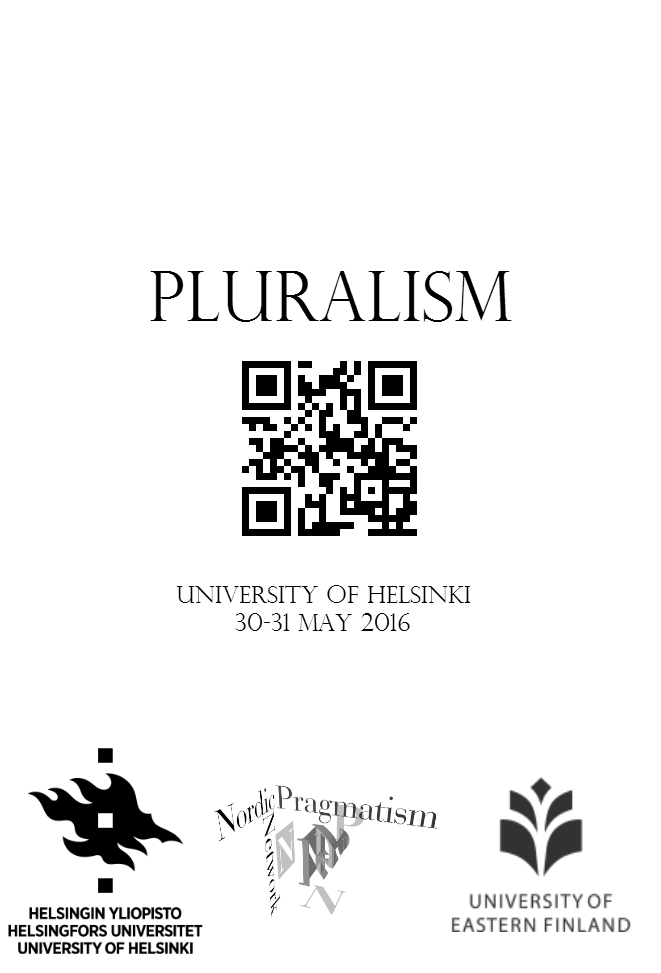Workshop
Helsinki, Finland
30-31 May 2016
Introduction
Originally a term for art in ontology, pluralism has become to mean an approach to cultural, ethnic and religious diversity. The philosophers and sociologists of the pragmatist tradition, beginning with William James and John Dewey, advanced forms of cultural pluralism, prefiguring the much debated multiculturalism of today. The notion was also adopted by the central figures of the liberal tradition in political philosophy, such as Isaiah Berlin and John Rawls, as well as their opponents from different directions.
In contemporary debates in ethics and political philosophy, pluralism is used to refer (among other uses) both to the fact that different groups and individuals within any given contemporary Western society have somewhat differing ethical views or moral attitudes, and to a stance which prescribes an accepting or approving attitude towards ethical views that differ from one’s own (at least within some limits to be specified). This latter, normative version of pluralism may be reflected in the state’s policies towards groups with differing ethical views, as in political pluralism, or, alternatively, it may allude to a stance adopted by an individual towards the (conflicting) views of others.
The aim of this workshop is to clarify our understanding of this normative concept of pluralism, its merits and potential issues:
- What has pluralism meant in different contexts, especially to philosophers of the pragmatist tradition, but also to political liberalists and their contenders?
- What form(s) of pluralism is/are defensible against conceptual charges (of e.g. relativism) and sufficiently informed by our understanding of contemporary society?
- How could these forms of pluralism be reflected in educational theory and practice, especially in citizenship education?
- What is religious pluralism in distinction to political/ethical pluralism, or can such a distinction be made?
Venue
The workshop is organized by the GROW research project (University of Eastern Finland), the Academy of Finland Centre of Excellence, “Reasons and Religious Recognition” (University of Helsinki), research project “Reforming the Theory of Citizenship Education” (University of Helsinki research funds) and the Nordic Pragmatism Network. The workshop takes place at the Faculty room (tiedekuntasali) of the Faculty of Theology, University of Helsinki, address Vuorikatu 3, floor 5B.
Organizing committee:
- Henrik Rydenfelt (University of Eastern Finland)
- Sami Pihlström (University of Helsinki)
- Katariina Holma (University of Eastern Finland)
The workshop is open for all, but the organizers kindly ask for a registration by email in advance (info(at)nordprag.org).
Programme
Monday, 30 May
10.00-10.50
Chiara Ambrosio (UCL)
Peircean Pluralism?
10.50-11.40
Sami Pihlström (Helsinki)
The Plurality of Pluralisms in Pragmatically Pluralist Philosophy of Religion
11.40-12.30
Lunch
12.30-13.20
Henrik Rydenfelt (UEF)
Fallibilism: Can Pluralism Rest on Monism?
13.20-14.20
Mats Bergman (Helsinki)
Agnostic Pluralism and Pragmatic Hope
14.20-15.00
Coffee break
15.00-15.50
Brendan Hogan (NYU)
Pluralism as Fact, Norm, and Method
15.50-16.40
Katariina Holma (UEF)
Israel Scheffler’s Plurealism
16.40-17.00
Break
17.00-17.50
David Hildebrand (Denver)
Educating for Pluralistic Conflicts
Tuesday, 31 May
10.00-10.50
Antje Gimmler (Aalborg)
The Cultures of Normativity –Plurality in Everyday life and Theory
10.50-11.40
Leszek Koczanowicz (HCAS)
Dialogue and Universalization
11.40-12.00
Coffee break
12.00-12.50
Anniina Leiviskä (Helsinki)
Learning to Encounter Otherness and Difference: A Hermeneutic Perspective on Democracy and Civic Education
12.50-13.40
Heikki J. Koskinen (Helsinki)
Recognition-Relations and the Pluralism of Identities